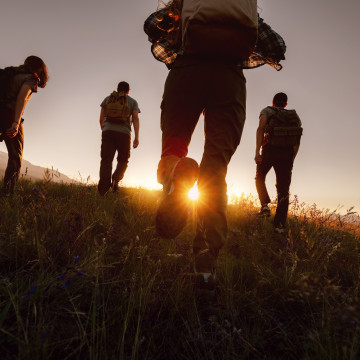

Year 11 Outdoor and Environmental Studies Units 1 and 2
Overview
In the exciting world of Outdoor and Environmental Studies, you’ll embark on a journey of discovery across Units 1 and 2. Get ready to step outside the classroom and into the great outdoors!
This course includes 3 x 5-day adventure-based camps that include amongst others Hiking, Whitewater Rafting, Mountain biking, Rock Climbing and a Cross Country Snow Skiing expedition.
In Unit 1, we’ll delve into the fundamentals of outdoor experiences, focusing on the importance of connecting with nature and developing essential skills for safe and enjoyable adventures. From hiking through Australian bush to navigating stunning landscapes, you’ll develop a clear understanding of the range of motivations for interacting with outdoor environments, the factors that affect an individual’s access to experiencing outdoor environments and how they connect with outdoor environments.
Unit 2 takes you deeper into the environmental side of things. Ever wondered about the delicate balance of ecosystems and how human activities impact the world around us? This unit will uncover the fascinating connections between people and the environment. You’ll explore sustainability, conservation, and even dive into the crucial topic of climate change. Get ready to be an eco-champion as you develop an understanding of how we can preserve and protect our planet for future generations. So, if you’re up for outdoor escapades and uncovering the secrets of nature, Outdoor and Environmental Studies is your gateway to adventure and environmental stewardship!
Who is it for?
VCE Outdoor and Environmental Studies is ideal for anyone who loves hiking, skiing, paddling or other outdoor pursuits, and wants to learn more about the natural environment and our interactions with it.
The course is a mix of sociology and science with a dash of PE and geography, so while it does have a significant practical component, it is an academic subject that is suitable for people with a broad range of interests.
This subject includes three practical outdoor experiences. These trips will involve spending time exploring the mountains and rivers of Victoria working with both Rubicon Outdoor School and Outdoor School Bogong and 15 Mile Creek campuses.
Outdoor and Environmental Studies prepares you for further study in fields such as outdoor recreation, environmental science, geography, and education, and it also provides you with skills and knowledge for pursuing your own outdoor interests.
What do you do?
In this course you will complete:
- Reading articles, watching videos and exploring websites to learn about outdoor environments, outdoor experiences and our interactions with them.
- Quizzes, interactive activities and other online learning tools.
- Online classes
- Weekly assigned tasks primarily consisting of short answer questions but also including research and multimedia tasks.
Three practical camp experiences. 3 x 5-day adventure-based camps that include amongst others Hiking, Whitewater Rafting, Mountain biking, Rock Climbing and a Cross Country Snow Skiing expedition. All equipment is provided for these camps and all abilities catered for. You just need to bring an open mind and your sense of adventure.
- During these experiences you will complete a logbook that will inform your School Assessed Coursework (SAC’s) in this subject.
Assessments take the form of short answer questions and case studies, visual/multimedia presentation, and outdoor experiences accompanied by logbooks.
What skills do you need?
There are no pre-requisites for this subject however:
- the practical experiences are a key component of the course and its assessment, so an ability and desire to attend these trips is essential
- while there is a significant practical component, this is also an academic course. An interest in learning about science, geography and the social sciences, as they relate to the outdoors, is also important.
What skills do you develop?
This course enables students to:
- develop skills and knowledge for safe and sustainable participation in outdoor experiences.
- analyse motivations for seeking outdoor experiences
- analyse different ways of knowing, experiencing and responding to outdoor environments
- analyse risk in outdoor environments and our responses to it.
- explain a range of factors that affect outdoor experiences.
- describe, compare and contrast the characteristics of different outdoor environments
- identify and evaluate the impacts of different types of activities on outdoor environments
- identify and apply practices for promoting positive impacts on outdoor environments.
Requirements
Readings and educational materials are all included on our online learning system so no texts will need to be purchased externally however there is a text that is recommended, the same text is used in Units 3 – 4 so if your intention is to continue on you might as well buy it while doing Unit 1 – 2
When it comes to outdoor experiences, main items like tents, cookers and other specialised equipment are provided for use. However, you will need to provide your own appropriate attire for the environments attended, we won’t make you guess what you need to bring, even a comprehensive packing list is included for you.
Things to think about
Get ready for an amazing journey in this course! We’ll be having various outdoor experiences, and hopefully, a lot of fun, especially when we jump into exciting activities like paddling, skiing, and hiking. But hold on, it’s not only about the action – we’re also going to dive into some really interesting learning.
We’ll explore and understand scientific, geographic, and social aspects, so an interest in the natural environment and a desire to learn about it will be of much greater use than mad MTB skills, a bomber roll or the ability to stomp a 540 spin-out in the park. And if you don’t know what any of that means, and just love spending time in the bush, that might be sign that you’ve come to the right place. (Although if you can bust out a back pan am on a big stopper or you learned to telemark before you learned to walk, you’re still welcome).
When it’s time to show what you’ve learned, you’ll use a mix of writing, presentations, and hands-on demonstrations for assessments. So, brace yourself for adventure and lots of brainpower!
Things you can do now
For a detailed understanding of what the content of this course includes go to the VCAA website and OES study design.
If you’d like to get your outdoor adventure on from the comfort of your couch, these films/books are all referred to at some point in the course but are listed as optional viewing – so if you have some time over the summer, you might want to get some extra credit in the bank. And they are all outdoor classics. The films were all streaming on various services at the time of writing.
Meru (2015) – Conrad Anker, Jimmy Chin and Renan Ozturk take on the most technically difficult peak in the Himalayas. An excellent study in one kind of motivation.
Blood Road (2017) – The mysteries surrounding her father’s death in the Vietnam war lead ultra-endurance mountain biker Rebecca Rusch on an emotional journey as she pedals 1200 miles of the Ho Chi Minh trail. Lots in here but a good insight into different understandings of outdoor environments.
Into Thin Air – This one’s a book. The mountaineering classic by Jon Krakauer about the 1995 disaster on Everest. There’s lot in here about motivation, risk, commercialisation of outdoor experiences and human impact. It was made into a 1997 movie of the same name, or you could watch the 2015 film Everest about the same set of events in which Jon Krakauer is a character.
127 Hours (2010) – Aaron Ralston gets stuck in a Utah Canyon. A study in one key aspect of outdoor safety.
Into the Wild (2007) – Another Jon Krakauer book made into a movie – the true story of Christopher McCandless’ journey into the Alaskan wilderness. This is fascinating from a motivation perspective, but there is also plenty in here about risk and the way people interact with outdoor places (and each other).
Free Solo (2018) – Alex Honnold climbs El Capitan in Yosemite National Park without ropes. A case study in risk and motivation.
Things to have a look at
You may want to check out the website for Rubicon who we will be partnering with for our outdoor experiences. It is likely that we will do one program based at this school’s residential site. You will get some insight to activities we may participate in during our first camp.
Outdoor School
You may want to check out the website for the Outdoor School to get a feel for the locations we may be attending and the experiences that are offered overall.